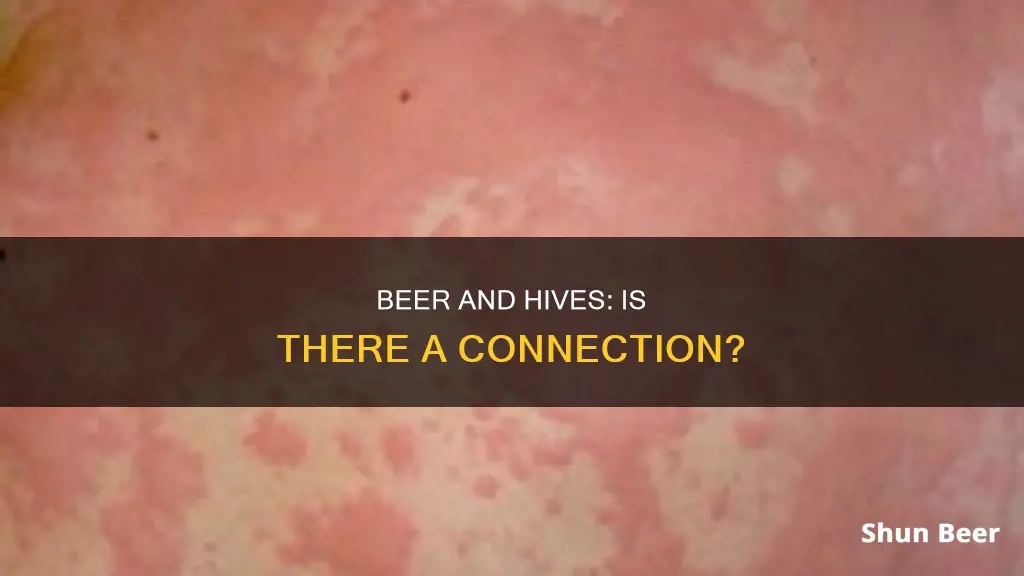
Alcohol allergies are rare, but they do exist. Alcohol intolerance is more common and is caused by a genetic condition in which the body can't break down alcohol efficiently. Alcohol intolerance can cause immediate, uncomfortable reactions, such as a stuffy nose, facial redness, and red, itchy skin bumps (hives). Beer contains many ingredients, including malt barley, brewer's yeast, hops, and assorted flavorings, and an allergy to one of these ingredients is more likely than a true beer allergy. Wine contains natural histamine-like chemicals that can cause flushing and hives in susceptible people, and other alcoholic drinks contain common allergens like yeast, hops, barley, and wheat.
| Characteristics | Values |
|---|---|
| Prevalence | Alcohol intolerance is caused by a genetic condition and is more common in people of Asian descent. |
| Symptoms | Hives, facial redness, worsening of asthma, stuffy or runny nose, nausea, vomiting, fast heartbeat, and palpitations. |
| Causes | Alcohol intolerance is caused by a deficiency of enzymes that break down alcohol, such as alcohol dehydrogenase (ADH) or aldehyde dehydrogenase (ALDH). |
| Treatment | The only way to prevent an allergic reaction is to avoid alcohol. Antihistamines may also help with mild symptoms. |
What You'll Learn

Alcohol intolerance
People of East Asian descent are most at risk of alcohol intolerance, with between 30-50% having the condition, commonly referred to as "Asian flush" or "Asian glow". However, alcohol intolerance is not limited to those of Asian ancestry and can affect people of all races and ethnicities.
The only way to prevent the uncomfortable reactions caused by alcohol intolerance is to avoid alcohol or limit consumption. In some cases, what seems to be alcohol intolerance might be a reaction to something else in an alcoholic beverage, such as chemicals, grains, or preservatives, or even the result of combining alcohol with certain medications.
If you are experiencing any uncomfortable reactions after consuming alcohol, it is important to consult your doctor to determine the cause and receive appropriate advice and treatment.
Beer and Twitch: Drinking on a Livestream
You may want to see also

Allergic to a specific ingredient in beer
Allergic reactions to beer are rare, but they can happen. If you are allergic to beer, it is likely that you are allergic to a specific ingredient in beer. Beer is made up of many ingredients, including water, malt barley, brewer's yeast, hops, and assorted flavorings. Depending on the brand, beer may also contain colorings, preservatives, and other grains such as wheat and sorghum.
If you are allergic to a specific grain, you will experience symptoms when consuming other food products containing that allergen. For example, a small 2014 study of Chinese people with a beer allergy found that sensitivity to sorghum or sorghum malt was the most common cause. Additionally, people who are allergic to wheat are often also allergic to barley.
If you suspect that you are allergic to a specific ingredient in beer, you should consult a doctor or allergist. They may recommend allergy testing, such as a skin prick test, to help determine your specific allergies. In the meantime, if you experience uncomfortable symptoms after drinking beer, you can try switching to another brand or taking an antihistamine to alleviate mild symptoms.
Beer and Noom: What's the Verdict?
You may want to see also

Alcohol allergy symptoms
Alcohol intolerance is a genetic condition that makes it difficult for the body to break down alcohol efficiently. It is not a true allergy, but some people may experience allergic reactions to ingredients in alcoholic beverages, such as grains, chemicals, or preservatives.
- Skin reactions: Alcohol can cause red, itchy skin bumps (hives), rashes, and flushing (redness in the face).
- Respiratory issues: Allergic reactions may lead to a runny or stuffy nose, coughing, and difficulty breathing.
- Gastrointestinal problems: Stomach cramps, upset stomach, and vomiting can occur.
- Other symptoms: Alcohol allergies may also cause headache, low blood pressure, increased heart rate, and anxiety.
It is important to note that these symptoms can vary in severity and may be triggered by even a small amount of alcohol. If you experience any of these symptoms after consuming alcohol, consult your doctor to determine if you have an alcohol allergy or intolerance.
Beer and Augmentin: Safe Mix?
You may want to see also

Alcohol intolerance symptoms
Alcohol intolerance can cause immediate, uncomfortable reactions after drinking alcohol. These reactions are the body's way of telling you that alcohol is not safe for you.
The most common symptoms of alcohol intolerance include:
- Skin flushing, including a red face
- Hives (red, itchy skin bumps)
- Runny or stuffy nose
- Headache
- Low blood pressure
- Rapid heart rate
- Stomach pain
- Worsening of pre-existing asthma
People with alcohol intolerance have a genetic mutation that makes it hard for their bodies to break down alcohol. This condition is most common among people of East Asian descent, but it can affect all races and ethnicities.
If you experience any of these symptoms after consuming alcohol, it is important to consult your doctor to determine whether you have an alcohol intolerance or allergy.
It is important to note that the only way to prevent these uncomfortable reactions is to avoid alcohol or the particular substance that triggers your reaction.
Beer and Keto: What's the Verdict?
You may want to see also

Common allergens in alcoholic beverages
Alcohol allergies are rare, but if you have one, a tiny amount of alcohol may be enough to trigger a reaction. Alcoholic drinks are made from complex mixtures of grains, chemicals, and preservatives that the body needs to break down. If your body can't do this, you will have a reaction.
- Yeast, hops, barley, and wheat are common allergens found in beer and whiskey.
- Egg protein is often used in wine as a "fining agent" to reduce cloudiness. It is also used in cocktails and the Dutch liqueur, Advocaat.
- Sodium metabisulfite is a preservative commonly found in wine, particularly white wine and cask wine.
- Milk proteins are sometimes used in the fining process of wine, especially white wine. They are also used in many cocktails, including White and Pink Russians, Irish Mints, and Pina Coladas.
- Nuts are often used in seasonal brews of beer, and Southern Comfort contains tree nut derivatives.
- Almonds are widely used in the creation of alcoholic drinks and cocktails. Almond syrup is also used in many cocktails and is sometimes labelled as 'Orgeat' or 'Falernum'.
- Peanuts are classified as legumes, and those with a peanut allergy may experience cross-reactivity to chickpeas, which are used in cocktails, especially vegan ones, in the form of 'aquafaba' (chickpea water).
- Sulphites are preservatives that are produced naturally during the fermentation process. They are commonly found in beers, lagers, ciders, and wines.
- Histamine is a byproduct of fermentation or brewing and is found in varying amounts in wines, with higher amounts in red wines than in white wines.
Japanese Beer Cups: The Science Behind the Froth
You may want to see also
Frequently asked questions
An allergy to beer is called a beer allergy. True beer allergies are rare, and it is more likely that you are allergic to a specific ingredient in beer.
The symptoms of a beer allergy are similar to those of other allergic reactions and can include abdominal pain, bloating, chest tightness, hives, wheezing, and chest pain.
Risk factors for a beer allergy include a family history of allergies, a personal or family history of asthma, and allergies to grains or other foods.
A beer allergy can be diagnosed through skin and blood allergy tests, as well as by identifying specific ingredients that trigger symptoms.
The only way to prevent a beer allergy reaction is to avoid beer or the specific ingredient causing the allergy. Antihistamines may help with mild symptoms, and severe reactions may require emergency medical care.







